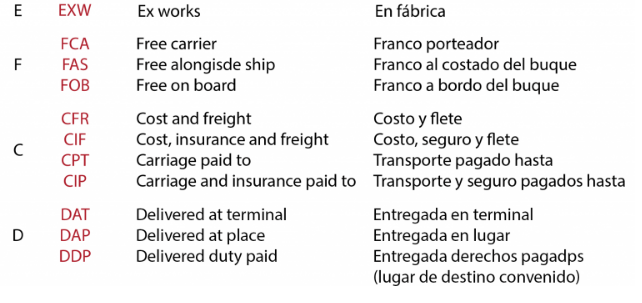WHAT ARE THE INCOTERMS RULES?
Links
When international commercial transactions are carried out, one of the aspects that must be fixed more precisely is the place where the goods will be delivered. This place, agreed between the buyer and the seller, must be reflected in the international sales contract.
Expressing in the contract of sale how the goods will be delivered could be done in two ways: defining as exactly as possible the place of delivery, who takes care of the transport, who assumes the risk, who must carry out the import or export procedures, etc. and, in addition, in different languages, or using the Incoterms rules.
The Incoterms rules (acronym for international commercial terms) are defined by the International Chamber of Commerce (ICC), with the purpose of contributing to legal certainty in international merchandise sales operations and to the homogenization of their delivery conditions .
WHAT THE INCOTERMS RULES REGULATE?
The Incoterms rules are intended to delimit the rights and obligations of the parties involved in an international merchandise sale operation in regard to these five aspects:
• Obligations of the buyer and the seller.
• Costs assumed by each part.
• Merchandise insurance.
• Offices of
• Place and moment of delivery of the merchandise.
WHAT ASPECTS DO NOT REGULATE?
The following aspects are outside the scope of the Incoterms rules, although their negotiation may be affected by the agreed delivery conditions:
• Transfer of ownership of the merchandise.
• Purchase price, medium and payment term.
• Applicable regulations in case of breach of contract, its resolution and jurisdiction.
• Disclaimers due to merchandise.
SUMMARY TABLE OF THE INCOTERMS RULES 2010






